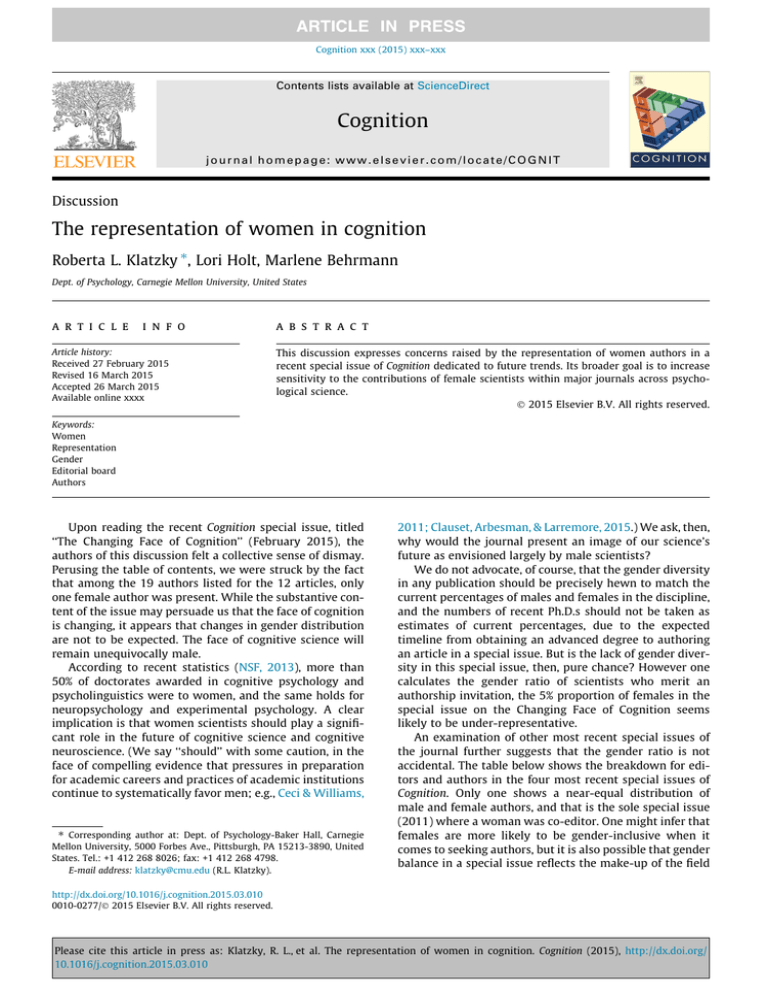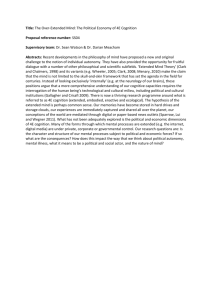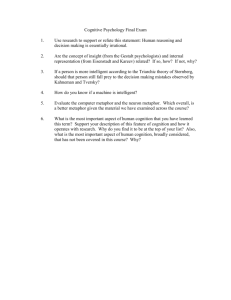
Cognition xxx (2015) xxx–xxx
Contents lists available at ScienceDirect
Cognition
journal homepage: www.elsevier.com/locate/COGNIT
Discussion
The representation of women in cognition
Roberta L. Klatzky ⇑, Lori Holt, Marlene Behrmann
Dept. of Psychology, Carnegie Mellon University, United States
a r t i c l e
i n f o
Article history:
Received 27 February 2015
Revised 16 March 2015
Accepted 26 March 2015
Available online xxxx
a b s t r a c t
This discussion expresses concerns raised by the representation of women authors in a
recent special issue of Cognition dedicated to future trends. Its broader goal is to increase
sensitivity to the contributions of female scientists within major journals across psychological science.
Ó 2015 Elsevier B.V. All rights reserved.
Keywords:
Women
Representation
Gender
Editorial board
Authors
Upon reading the recent Cognition special issue, titled
‘‘The Changing Face of Cognition’’ (February 2015), the
authors of this discussion felt a collective sense of dismay.
Perusing the table of contents, we were struck by the fact
that among the 19 authors listed for the 12 articles, only
one female author was present. While the substantive content of the issue may persuade us that the face of cognition
is changing, it appears that changes in gender distribution
are not to be expected. The face of cognitive science will
remain unequivocally male.
According to recent statistics (NSF, 2013), more than
50% of doctorates awarded in cognitive psychology and
psycholinguistics were to women, and the same holds for
neuropsychology and experimental psychology. A clear
implication is that women scientists should play a significant role in the future of cognitive science and cognitive
neuroscience. (We say ‘‘should’’ with some caution, in the
face of compelling evidence that pressures in preparation
for academic careers and practices of academic institutions
continue to systematically favor men; e.g., Ceci & Williams,
⇑ Corresponding author at: Dept. of Psychology-Baker Hall, Carnegie
Mellon University, 5000 Forbes Ave., Pittsburgh, PA 15213-3890, United
States. Tel.: +1 412 268 8026; fax: +1 412 268 4798.
E-mail address: klatzky@cmu.edu (R.L. Klatzky).
2011; Clauset, Arbesman, & Larremore, 2015.) We ask, then,
why would the journal present an image of our science’s
future as envisioned largely by male scientists?
We do not advocate, of course, that the gender diversity
in any publication should be precisely hewn to match the
current percentages of males and females in the discipline,
and the numbers of recent Ph.D.s should not be taken as
estimates of current percentages, due to the expected
timeline from obtaining an advanced degree to authoring
an article in a special issue. But is the lack of gender diversity in this special issue, then, pure chance? However one
calculates the gender ratio of scientists who merit an
authorship invitation, the 5% proportion of females in the
special issue on the Changing Face of Cognition seems
likely to be under-representative.
An examination of other most recent special issues of
the journal further suggests that the gender ratio is not
accidental. The table below shows the breakdown for editors and authors in the four most recent special issues of
Cognition. Only one shows a near-equal distribution of
male and female authors, and that is the sole special issue
(2011) where a woman was co-editor. One might infer that
females are more likely to be gender-inclusive when it
comes to seeking authors, but it is also possible that gender
balance in a special issue reflects the make-up of the field
http://dx.doi.org/10.1016/j.cognition.2015.03.010
0010-0277/Ó 2015 Elsevier B.V. All rights reserved.
Please cite this article in press as: Klatzky, R. L., et al. The representation of women in cognition. Cognition (2015), http://dx.doi.org/
10.1016/j.cognition.2015.03.010
2
R.L. Klatzky et al. / Cognition xxx (2015) xxx–xxx
that is being highlighted. Again, the prevalence of male
authors in the most recent issue seems unlikely to be
explained on that basis.
Year Special Issue
Topic (# articles)
Editor
gender
Prop.
Prop.
male
male
authors first
author
2015 Changing Face of
Cognition (12)
2011 Probabilistic
models of
cognitive
development (10)
2009 Reinforcement
learning (6)
2009 Objects and
Attention (7)
Male
0.95
0.92
1 male, 0.52
1 female
0.40
(three of eight are women), although there appears to be
room for balance in the journal’s editorial board. It is particularly unfortunate that the representation of women has
failed to penetrate the authorship rosters of just those
issues that are meant to shape the field, with the result
that a new generation of women scientists will fail to
recognize themselves in the vision of the future that they
offer. We hope that calling attention to this matter will
increase sensitivity to the contributions of female scientists, not only in Cognition but in other major journals in
psychological science, as well.
References
2 male
0.85
1.00
Male
0.76
0.86
We do not mean to take Cognition to task unfairly. The
gender distribution among associate editors is near parity
Ceci, S. J., & Williams, W. M. (2011). Understanding current causes of
women’s underrepresentation in science. Proceedings of the National
Academy of Sciences of the United States of America, 108, 3157–3162.
Clauset, A., Arbesman, S., & Larremore, D. B. (2015). Systematic inequality
and hierarchy in faculty hiring networks. Science Advances, 1(1),
e1400005. http://dx.doi.org/10.1126/sciadv.1400005 (01 February
2015).
NSF (2013). <http://www.nsf.gov/statistics/sed/2013/data-tables.cfm>
(Table 16).
Please cite this article in press as: Klatzky, R. L., et al. The representation of women in cognition. Cognition (2015), http://dx.doi.org/
10.1016/j.cognition.2015.03.010



